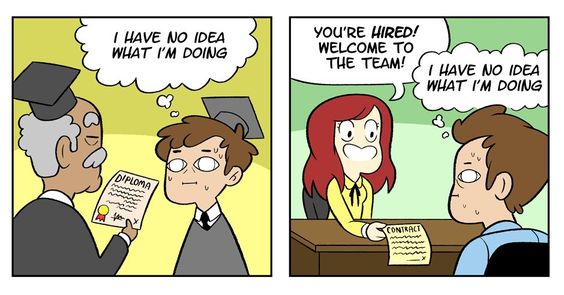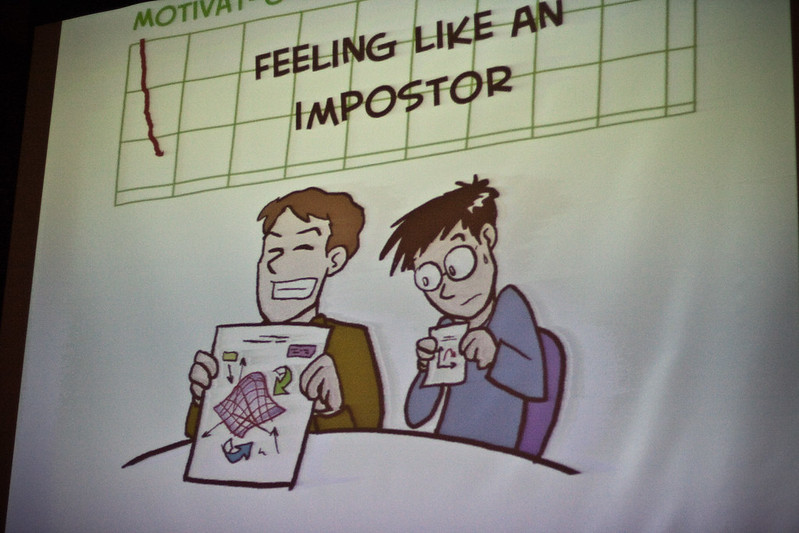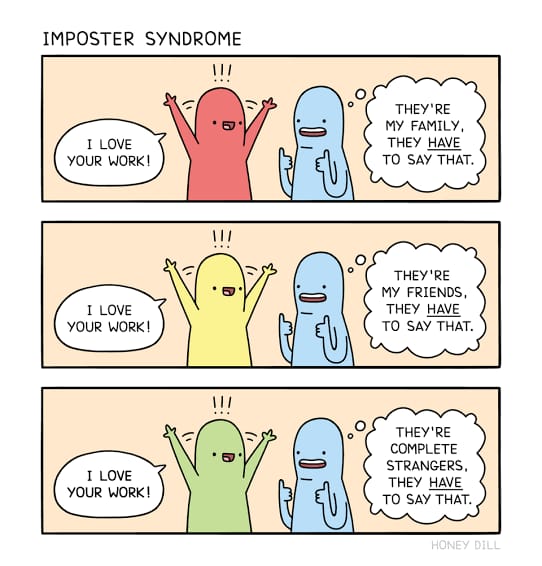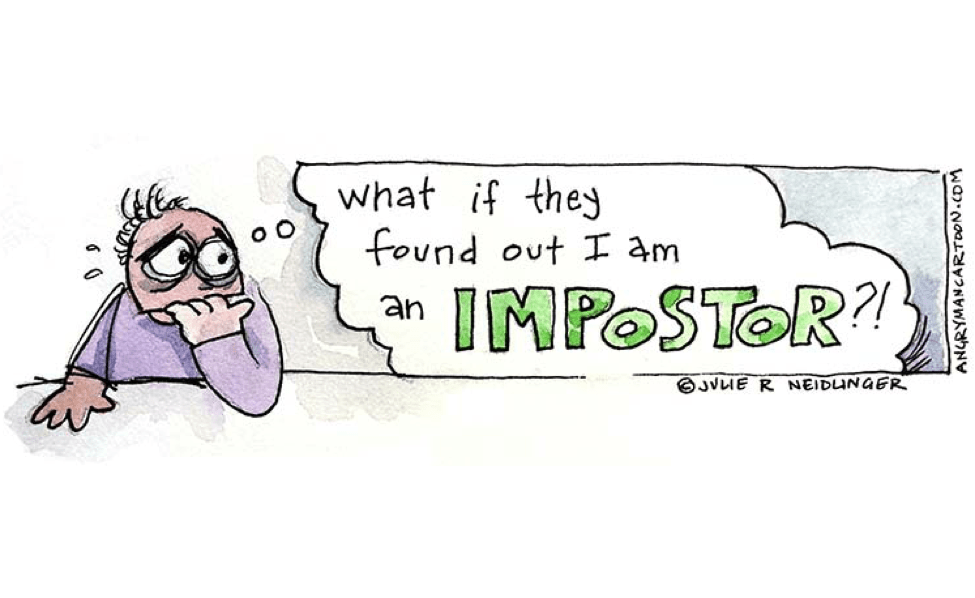Impostor syndrome causes the rise of so much contradictory feelings that sometimes we misconstrue it as a part of our emotional system. Yes, “we”. We all have experienced it, knowingly or unknowingly; at some point of our life.
It’s the first day of your job. You’re both nervous and thrilled for the new phase of your life. After a pretty harsh period of grinding and hustling through life, you’re finally about to have some stability. At least you think so.
However, your dream bubble pops in no time. You feel like you’re a clear misfit. The all-consuming feeling of inadequacy causes you shame. The feeling of not being good enough among all the incredible people starts to cause you uneasiness.
You say to yourself, “All my achievements are utter lies. I am being overly appreciated. Am I a fraud? Maybe I am an IMPOSTOR.”

This is just an example. It’s absolutely natural to feel uneasy on the first day of your new job. The first day of your school. Or a new place that you might be visiting. The feeling of not belonging fades away with time. You just have to stop questioning the causes of admiration. If you keep reprimanding yourself relentlessly and deflect every appreciation you receive, then you might be experiencing what is called “the impostor phenomenon”. Also known as “the impostor syndrome”
Is ‘Impostor Syndrome’ an Illness?
When we hear the word ‘syndrome’ we associate it with mental illness.
But is impostor syndrome really a mental disorder? The answer is no.
‘Impostor Syndrome’ is an internal experience; albeit an unpleasant one, that occurs to an individual. People experiencing this feel like they are an impostor who faked their way into the group and constantly feel inadequate. The causes aren’t medical.

While experiencing Impostor Syndrome, people set their own standards unrealistic or “exceedingly high”- torture themselves with the idea of not being good enough. The term was first coined by the clinical psychologists Pauline Clance and Suzanne Imes in the 1970s.
The feeling of being an impostor mostly plays out when there’s are transitional experience. For example: new career, new promotion, new place etc. It can be anything that puts people out of their comfort zone and they suddenly feel like they do not belong there. As if they don’t deserve the compliments they receive.
Are You Suffering from Impostor Syndrome?
Dr. Valerie Young, author of The Secret Thoughts of Successful Women: Why Capable People Suffer from the Impostor Syndrome and How to Thrive in Spite of It, has identified five types of ‘impostors’ Following are the types and with each type, a checklist is added you can look if you can find yourself in any.
CAUTION: There is A Fine Line Between Being Insecure and Being An Impostor
Impostor Type 1: The Perfectionist
Rather than celebrating their achievements, a perfectionist has a tendency to focus on areas where they could have done better.
- You’re a micromanager.
- You find it hard to delegate and when you do, the results mostly disappoint you.
- When you miss reaching the bar on something, you accuse yourself.
- You have this insane urge of being 100% perfect all the time.
Recommended response: Allow yourself to make a certain amount of mistakes. Accept it as a natural part of the process.
Impostor Type 2: The Superhero
These are the people who put extreme effort leading to burnout. It can also affect health in general, be it physical or mental.
- You carry on working even after you’ve completed that day’s work.
- You find taking a break stressful.
- You’ve sacrificed your passion and hobbies to work.
- You feel like you haven’t truly earned your title.
Recommended response: Take rest and let yourself recharge.
Impostor Type 3: The Natural Genius
Natural geniuses attain many new skills with comfort and ease. They feel ashamed and weak when faced with a goal that requires effort.
- You are used to excelling without much effort.
- You have a golden track record.
- You were told frequently as a child that you were the genius among your peers.
- When you’re faced with a setback, your confidence tumbles because not performing well provokes a feeling of shame.
Recommended response: Give yourself time before being so hard on yourself. Tell yourself that it’s okay to need to be expert at something.
Impostor Type 4: The Soloist
The soloist, as the name suggests, prefers to work alone. They feel, asking for help reveals incompetence.
- You firmly feel that you need to complete the things on your to-do list on your own.
- You don’t need anyone’s help.
- You phrase requests in terms of the requirements of the project, rather than your needs as a person.
Recommended response: Break the silence due to shame and ask for help when you need it. It only projects your confidence if not anything else.
Impostor Type 5: The Expert
The expert doesn’t lay back until finishing a task; to a point where they feel that they know everything about the subject.
- You feel uncomfortable when someone calls you an expert.
- You refrain from applying to jobs unless you’ve met every single requirement.
- You’re relentlessly seeking out training or certifications because you assume you need to improve your skills because you’re not good enough.
- Even after being in your current role for some time,you feel like someone else could do your job better.
Recommended response: What you need is to remind yourself that there’s always more to learn and no human can know everything.
Feeling Like an Impostor: You’re Not The Only One
Yes, we understand that impostor phenomenon often makes you feel like you’re the only one faking your way into the world of people who know exactly what they’re doing. But you need to tell yourself this, and we can’t stress enough how much- that you’re not alone.
An International Journal of Behavioral Science research in 2011 talks about the approximately 70 percent of people who will experience at least one episode of impostor syndrome in their lives. It is more prevalent among those who are considered to be high-achievers.
Tina Fey: “The beauty of the impostor syndrome is you vacillate between extreme egomania and a complete feeling of: ‘I’m a fraud! Oh God, they’re onto me! I’m a fraud!’

Maya Angelou: After the publication of her 11th book, the award winning author said that every time she wrote another one she’d think to herself: “Uh-oh, they’re going to find out now. I’ve run a game on everybody.”
Michelle Obama: The role model of innumerable young women, Michelle Obama used to lie awake at night asking herself: Am I too loud? Too much? Dreaming too big? “Eventually, I just got tired of always worrying what everyone else thought of me,” she said. “So I decided not to listen.”
Look Your Fears in the Eye: Discard Impostorism
The prime key to stop feeling like an impostor is to stop thinking like an impostor
01. It’s Okay To Not to Feel Okay
First of all, allow yourself to feel whatever you’re feeling. A lot of the time, impostor syndrome causes irrational unhappiness. Being positive doesn’t necessarily mean not acknowledging the hurdles you’re facing and being happy all the time.

02. Know the Signs
Identify when you’re humbled and when you’re just questioning your own abilities. Recognize the vital signs of impostor syndrome.
This is crucial because this impostor syndrome causes self-doubt.
Awareness lets you know that you are in need of yourself right now, before everything else.
03. Separate Feelings From Facts
Your mind is not always your friend. Impostor syndrome causes your mind to feed you with different kinds of feelings. Experts say we have 60,000 to 80,000 thoughts a day, so filtering is needed.
It’s important to remember that the feelings are not facts. Sometimes, the unsettling feeling is the evidence that you are doing something courageous.
FEELING stupid doesn’t necessarily equals BEING stupid
04. Negate the Comparison
Everybody struggles with something. Everybody’s just winging it. So cut out the comparison. Just focus on yourself. For many people, self-doubt is persistent; it’s just a matter of marching ahead despite all the struggles impostor syndrome causes.
Pat your back when you’ve done great work, criticise yourself to a healthy limit and focus on the value that you provide. And all this- without anyone else in the frame.

05. Embrace Your Imperfection: Fail Better
Call yourself a ‘Work in Progress’. Seeking perfectionism can be super counterproductive. Remembering that nobody is perfect, and mistakes are an inevitable part of life increases resilience and promotes your growth.
06. Revisit Your Past Accomplishments
Maintain a diary or smear your wall with sticky-notes, or you can use Trello: a project management tool; to remind yourself of all the things you’ve done so far. In moments of feeling less-than, a tangible reminder of your achievements can be a kind act to yourself.
07. Find Source of Affirmation: Someone to Lend You An Ear
The therapeutic effects of being able to talk candidly should not be underestimated. It can be a family member, a friend, a mentor, or even your boss.
A heart to heart conversation with someone who knows you and supports you can be significantly calming. It can assure you that your impostor feelings are normal but also irrational.
08. Own Your Accolades
If you are able to get work done in comparatively less time and effort, it doesn’t mean that it was easy. Your expertise in no way should discount your credit. Humility and worthiness have nothing to do with each other.
So if someone compliments you for being awesome, be humble but don’t deflect. Receive the commendation with appropriate stride and grace.

Last But Not The Least
The only difference between the people who do and do not go through this experience is in the response. The same situation can trigger an impostor feeling in some, and a feeling of challenge in others.
No matter which group you belong to, you need to be kind to be yourself. You need to understand that you’re merely a human. A complex combination of emotions which becomes even more complicated because of all the disbelief that impostor syndrome causes. You can also try to put it as Carl Richards does.
So now when I start to hear that voice in my head, I take a deep breath, pause for a minute, put a smile on my face and say, “Welcome back old friend. I’m glad you’re here. Now, let’s get to work.”
-Carl Richards


























Leave a Reply